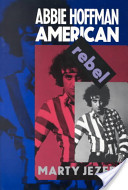
Abbot Howard Hoffman was a controversial American political and social activist who co-founded the Youth International Party ("Yippies") and was a member of the Chicago Seven. He was also a leading proponent of the Flower Power movement.

Steal This Book is a book written by Abbie Hoffman. Written in 1970 and published in 1971, the book exemplified the counterculture of the sixties. The book sold more than a quarter of a million copies between April and November 1971. The number of copies that were stolen is unknown.

The Youth International Party (YIP), whose members were commonly called Yippies, was an American youth-oriented radical and countercultural revolutionary offshoot of the free speech and anti-war movements of the late 1960s. It was founded on December 31, 1967. They employed theatrical gestures to mock the social status quo, such as advancing a pig called "Pigasus the Immortal" as a candidate for President of the United States in 1968. They have been described as a highly theatrical, anti-authoritarian, and anarchist youth movement of "symbolic politics".
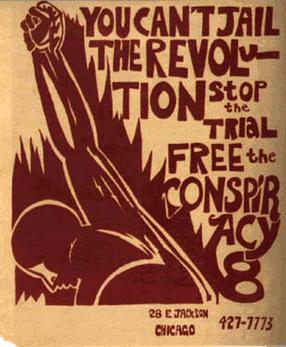
The Chicago Seven, originally the Chicago Eight and also known as the Conspiracy Eight or Conspiracy Seven, were seven defendants – Rennie Davis, David Dellinger, John Froines, Tom Hayden, Abbie Hoffman, Jerry Rubin, and Lee Weiner – charged by the United States Department of Justice with conspiracy, crossing state lines with intent to incite a riot, and other charges related to anti-Vietnam War and 1960s counterculture protests in Chicago, Illinois during the 1968 Democratic National Convention. The Chicago Eight became the Chicago Seven after the case against codefendant Bobby Seale was declared a mistrial.

Flower power was a slogan used during the late 1960s and early 1970s as a symbol of passive resistance and nonviolence. It is rooted in the opposition movement to the Vietnam War. The expression was coined by the American Beat poet Allen Ginsberg in 1965 as a means to transform war protests into peaceful affirmative spectacles. Hippies embraced the symbolism by dressing in clothing with embroidered flowers and vibrant colors, wearing flowers in their hair, and distributing flowers to the public, becoming known as flower children. The term later became generalized as a modern reference to the hippie movement and the so-called counterculture of drugs, psychedelic music, psychedelic art and social permissiveness.
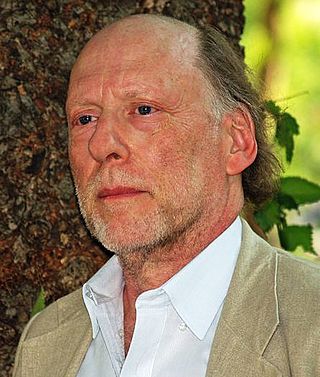
Todd Alan Gitlin was an American sociologist, political activist and writer, novelist, and cultural commentator. He wrote about the mass media, politics, intellectual life and the arts, for both popular and scholarly publications.

Steal This Movie! is a 2000 American biographical film directed by Robert Greenwald and written by Bruce Graham, based on the 1976 book To America with Love: Letters From the Underground by Anita and Abbie Hoffman and the 1992 book Abbie Hoffman: American Rebel by Marty Jezer. The film follows 1960s radical figure Abbie Hoffman, and stars Vincent D'Onofrio and Janeane Garofalo, with Jeanne Tripplehorn and Kevin Pollak.
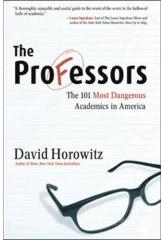
The Professors: The 101 Most Dangerous Academics in America is a 2006 book by conservative American author and policy advocate David Horowitz. Contending that many academics in American colleges hold anti-American perspectives, Horowitz lists one hundred examples who he believes are sympathetic to terrorists and non-democratic governments.

Jon Wiener is an American historian and journalist based in Los Angeles, California. His most recent book is Set the Night on Fire: L.A. in the Sixties, a Los Angeles Times bestseller co-authored by Mike Davis. He waged a 25-year legal battle to win the release of the FBI's files on John Lennon. Wiener played a key role in efforts to expose the surveillance, as well as the behind-the-scenes battling between the government and the former Beatle, and is an expert on the FBI-versus-Lennon controversy. A professor emeritus of United States history at the University of California, Irvine and host of The Nation's weekly podcast, Start Making Sense, he is also a contributing editor to the progressive political weekly magazine The Nation. He also hosts a weekly radio program in Los Angeles.
Marty Jezer was an activist and author. Born Martin Jezer and raised in the Bronx, he earned a history degree from Lafayette College. He was a co-founding member of the Working Group on Electoral Democracy, and co-authored influential model legislation on campaign finance reform that has so far been adopted by Maine and Arizona. He was involved in state and local politics, as a campaign worker for Bernie Sanders, Vermont's Independent Congressional Representative, and as a columnist and Town Representative.

Jonah Raskin is an American writer who left an East Coast university teaching position to participate in the 1970s radical counterculture as a freelance journalist, then returned to the academy in California in the 1980s to write probing studies of Abbie Hoffman and Allen Ginsberg and reviews of northern California writers whom he styled as "natives, newcomers, exiles and fugitives." Beginning as a lecturer in English at Sonoma State University in 1981, he moved to chair of the Communications Studies Department from 1988 to 2007, while serving as a book reviewer for the San Francisco Chronicle and the Santa Rosa Press-Democrat. He retired from his teaching position in 2011.
Mervyn "Skip" Williamson was an American underground cartoonist and central figure in the underground comix movement. Williamson's art was published in the National Lampoon, High Times, the Realist, the Industrial Worker, the Chicago Seed, Encyclopædia Britannica and others. His best-known character is Snappy Sammy Smoot.
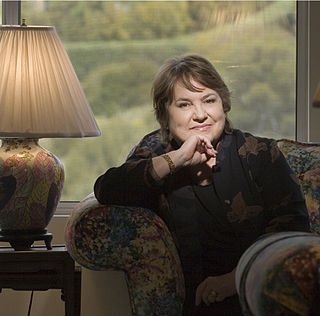
Carolyn See was a professor emerita of English at the University of California, Los Angeles, and the author of ten books, including the memoir, Dreaming: Hard Luck and Good Times in America, an advice book on writing, Making a Literary Life, and the novels There Will Never Be Another You, Golden Days, and The Handyman. See was also a book critic for The Washington Post for 27 years.

Gary Eugene Rader was an American Army Reservist known for burning his draft card in protest of the Vietnam War, while wearing his U.S. Army Special Forces uniform. Afterward, he engaged in anti-war activism.

Peter Plagens is an American artist, art critic, and novelist based in New York City. He is most widely known for his longstanding contributions to Artforum and Newsweek, and for what critics have called a remarkably consistent, five-decade-long body of abstract formalist painting. Plagens has written three books on art, Bruce Nauman: The True Artist (2014), Moonlight Blues: An Artist's Art Criticism (1986) and Sunshine Muse: Modern Art on the West Coast, 1945-70 (1974), and two novels, The Art Critic (2008) and Time for Robo (1999). He has been awarded major fellowships for both his painting and his writing. Plagens's work has been featured in surveys at the Museum of Modern Art, Los Angeles County Museum of Art (LACMA), Whitney Museum, and PS1, and in solo exhibitions at the Hirshhorn Museum and Las Vegas Art Museum. In 2004, the USC Fisher Gallery organized and held a 30-year traveling retrospective of his work. Critics have contrasted the purely visual dialogue his art creates—often generating more questions than answers—with the directness of his writing; they also contend that the visibility of his bylines as a critic has sometimes overshadowed his artmaking—unduly. Los Angeles Times critic David Pagel described Plagens's painting as a "fusion of high-flying refinement and everyday awkwardness" with an intellectual savvy, disdain for snobbery and ungainliness he likened to Willem de Kooning's work. Reviewing Plagens's 2018 exhibition, New York Times critic Roberta Smith called the show an "eye-teasing sandwich of contrasting formalist strategies," the hard-won result of a decade of focused experimentation.
The New Left was a broad political movement that emerged from the counterculture of the 1960s and continued through the 1970s. It consisted of activists in the Western world who, in reaction to the era's liberal establishment, campaigned for freer lifestyles on a broad range of social issues such as feminism, gay rights, drug policy reforms, and gender relations. The New Left differs from the traditional left in that it tended to acknowledge the struggle for various forms of social justice, whereas previous movements prioritized explicitly economic goals. However, many have used the term "New Left" to describe an evolution, continuation, and revitalization of traditional leftist goals.
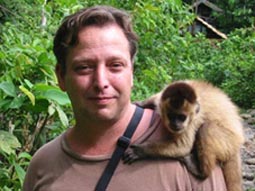
Al Giordano was an American journalist, political commentator, and anti-nuclear and environmental activist and organizer.
Robert R. Kirsch was an American literary critic and author. He was the literary editor of The Los Angeles Times for more than two decades.
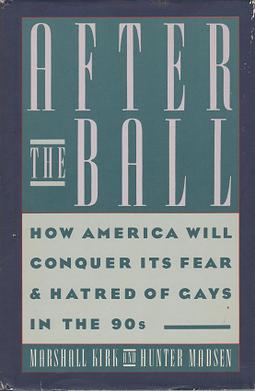
After the Ball: How America Will Conquer Its Fear and Hatred of Gays in the '90s is a 1989 book by neuropsychologist Marshall Kirk and advertising executive Hunter Madsen about LGBT rights in the United States. The book was expanded from a 1987 article by Kirk and Madsen called "The Overhauling of Straight America", published in Guide magazine.
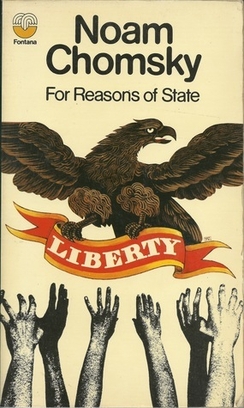
For Reasons of State is a 1973 collection of political essays by Noam Chomsky.
